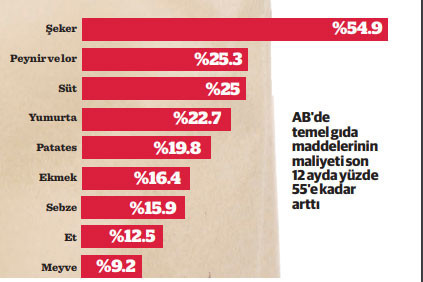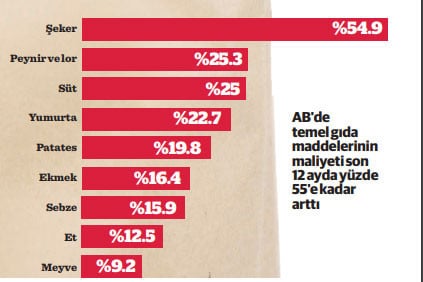Despite falling energy prices, rising food costs have brought governments and retailers face to face in Europe. The British Financial Times newspaper, which made the headlines about the rising food prices, wrote that Europe’s retailers and their governments are engaged in the most fierce struggle in 50 years over food costs. According to Eurostat, the EU statistics office, food prices in the European Union rose 16.6 percent through April, well above the headline inflation rate of 8.1 percent. Some of the biggest increases were in staple food prices, with the cost of eggs rising by 22.7 percent, whole milk by 25 percent and sugar by 54.9 percent.

“Although lower energy prices eased general price pressures, the rise in the cost of food continued to rise,” the FT wrote, pointing to “increasingly unconventional market interventions by politicians trying to quell public anger.” The countries most affected by the rising prices are the Central and Eastern European countries such as Hungary and Croatia. In these countries, action has been taken to limit the cost of basic necessities to protect consumers. Greece has taken an alternative approach to limiting prices by limiting retailers’ profit margins on food and other essentials. In larger economies, the parties sat at the table. In France, it was negotiated with supermarkets to offer a variety of products at the lowest possible price. Spain has become one of the few countries to lower the value-added tax on food. Italy is pushing to limit the prices of popular food items like pasta. Swedish economist Lars Jonung told the FT: “We haven’t had price controls in a general model in the Western world since the 1970s.” Monique Goyens, Executive Director of the Bureau Européen des Unions de Consommateurs, which represents 46 consumer organizations across Europe, said: “While some price hikes are justified, there are growing suspicions that others are opportunistic excuses that businesses make to inflate prices,” said their government “pushing consumers against rising prices.” Belgian consumer protection organization Test Achats and its Austrian counterpart, the AK, have also called for “price regulation” of foods. Retailers, on the other hand, argue that they are not to blame. Famous supermarkets Lidl, Spar, Auchan and Hungarian supermarket, the FT spoke to. chain Kodály Delikatessen says the wholesale price of certain products is higher than the cap retail price.Delikatessen argues that “Regulation forces us to sell at a loss”, while a representative of an international retailer said, “If you’re buying sugar, you pay 1.35 euros per kilo and it’s 0.85 euros. “You have to sell it,” he said. “While the measures have been successful in limiting the cost of basic necessities, economists think they are a bad solution for high food prices,” the British newspaper commented. urged to provide more ‘targeted policy interventions and social safety nets’. György Matolcsy, the head of the Hungarian central bank, said in a speech at a parliamentary session in December, ‘You cannot win this war with old tools. “Price ceilings and all similar ideas proved to be ineffective during socialism anyway.” You can also limit one type of milk, but the inflation basket contains dozens of types, according to Péter Virovácz, an analyst at ING Bank.
A professional writer by day, a tech-nerd by night, with a love for all things money.

